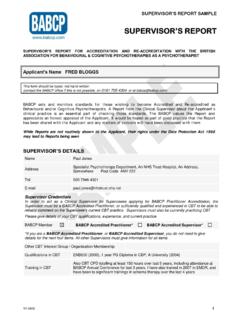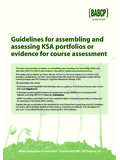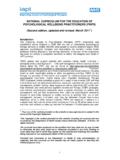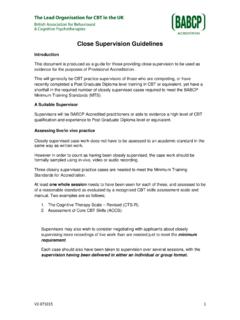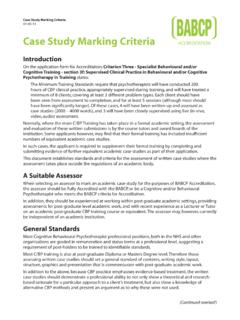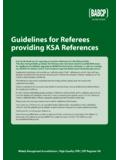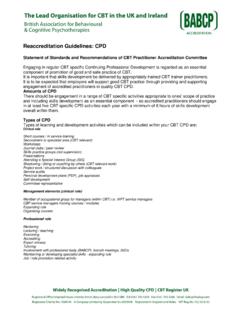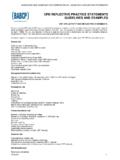Transcription of PROFESSIONAL REFERENCE - BABCP
1 PROFESSIONAL REFERENCE SAMPLE V2-0614 1 PROFESSIONAL REFERENCE PROFESSIONAL REFERENCE FOR ACCREDITATION WITH THE BRITISH ASSOCIATION FOR BEHAVIOURAL & COGNITIVE PSYCHOTHERAPIES AS A PSYCHOTHERAPIST Applicant s Name FRED BLOGGS This form should be typed, not hand-written (contact the BABCP office if this is not possible, on 0161 705 4304 or at BABCP sets and monitors standards for those wishing to become Accredited as Behavioural and/or Cognitive Psychotherapists. As well as a Supervor s Report, Applicants must submit a further PROFESSIONAL REFERENCE from a CBT Practitioner who knows their current practice. The BABCP values the REFERENCE and appreciates an honest appraisal of the Applicant. It would be hoped as part of good practice that the REFERENCE has been shared with the Applicant and any matters of concern will have been discussed with them. While Referencess are not routinely shown to the Applicant, their rights under the Data Protection Act 1998 may lead to References being seen.)
2 REFEREE S DETAILS Name Dr Talia Caven Address 111 Somewhere Street, A Town Post Code ANY 111 Tel: 020 7946 4321 E-mail Referee Credentials In order to act as a PROFESSIONAL Referee for individuals applying for BABCP Practitioner Accreditation, the Referee must be a BABCP Accredited Practitioner, or sufficiently qualified and experienced in CBT to be able to reliably comment on the Applicant s current CBT practice. Referees must also be currently practicing CBT Please give details of your CBT qualifications, experience, and current practice BABCP Member BABCP Accredited Practitioner* BABCP Accredited Supervisor* *If you are a BABCP Accredited Practitioner, or BABCP Accredited Supervisor, you do not need to give details for the next four items. All other Supervisors must give information for all items Other CBT Interest Group / Organisation Membership BPS Qualifications in CBT MSc Clinical Criminology including significant CBT components Training in CBT x2 six month CBT placements from MSc; 150hrs+ of CBT short training courses, workshops, conferences etc.
3 Experience using CBT 9 years in forensic setting with emphasis in the use of CBT; last 4 years in dedicated CBT service in Personality Disorders in patient and out patient service PROFESSIONAL REFERENCE SAMPLE V2-0614 2 All Referees must complete the rest of the items in the form Referee s Job Title / Employment Position Specialist Psychologist, CBT, employed in An NHS Trust, Somewhere Details of Referee s current CBT practice I currently work full time, between the in patient and out patient unit in a Personality Disorders service, employed as a CBT Specialist Psychologist. I work in a team of 7, including a lead psychologist, a further specialist psychologist, a consultant psychiatrist, and three CBT nurse consultants My work involves assessment and treatment, usually long term interventions, supervision of other CBT practitioners, and some CBT teaching Relationship to Applicant Do you currently provide Clinical Supervision to the Applicant?
4 Yes No What is your PROFESSIONAL relationship with the Applicant We are peer supervisees in a group which meets for 2 hours every 2 months. We work in different departments in the same Trust How long has the Applicant s CBT Practice been known to you? 2 years What is the nature, frequency and duration of your PROFESSIONAL contact with the Applicant? Peer CBT supervision group - 2 hrs every 2 months In-house teaching - meet every quarter for 2-3 hours Various service development meetings DETAILS OF APPLICANT S CURRENT CLINICAL PRACTICE Profile of Clinical Practice Type of clients Adults / children / learning disability etc. Adult secondary care, severe and enduring mental health Types of problems treated Chronic conditions, personality disorders, victims of abuse and other PTSD, depression, bipolar, OCD etc. CBT therapeutic approaches Formulation driven CBT, Beckian, Schema focussed Nature of Evidence What is the nature of the evidence you have of the Applicant s practice Live assessment / role-play / case reports / letters / verbal reports / personal observation / discussion / contribution in groups etc.
5 Case presentations, occasional video sessions, discussions in various group contexts, relating to client treatment, service development, teaching strategies for the Trust PROFESSIONAL REFERENCE SAMPLE V2-0614 3 Applicant s Understanding of the Therapeutic Relationship, and Level of Competence What information can you give about the Applicant s understanding of, and level of competence in the development, maintenance and ending of therapeutic relationships? Fred is a successful psychotherapist who has a particular strength in developing excellent working alliances with his usually complex and challenging clients. He is conscientious about managing endings for those clients who have had long term contact in psychotherapy, and has to work carefully with boundaries, making good and appropriate use of peers for advice and support Overall Level of Competence in CBT What information can you give about the Applicant s level of competence in their practice of Cognitive Behavioural Psychotherapy?
6 Fred is a reflective practitioner who develops his skills continuously to offer high quality CBT interventions, this is evidenced both in his own practice, and through his teaching and supervision of trainees Outcomes with a very difficult client group show that Fred is highly skilled in providing competent CBT practice Do you have any concerns about the Applicant s current practice? None From your knowledge of the Applicant, does he/she adhere to the Standards of Conduct, Performance and Ethics in the Practice of Behavioural and Cognitive Psychotherapies (attached)? Yes, Fred has a good understanding of and works to the guidelines Would you recommend the Applicant for Accreditation at present? IF NOT, please give details of what changes would be required Yes, without hesitation What additional comments can you make in support of this Applicant s application for Accreditation? Fred has absolute committment to the practice and development of CBT.
7 He ensures he is up to date with latest developments, and takes his own CPD activities seriously. He also encourages other CBTs to develop their skills and knowledge with enthusiasm DECLARATION This REFERENCE is an honest appraisal of the Applicant within the limits of my knowledge of them. Any areas of concern referred to in the REFERENCE have been discussed with the Applicant Referee s Signature Talia Caven Date 20/06/13 After completion, return this REFERENCE to the Applicant (in a sealed envelope, if you prefer) If you wish to discuss the completion of this Report, please contact: BABCP , Imperial House, Hornby Street, Bury, BL9 5BN T: 0161 705 4304 E: PROFESSIONAL REFERENCE SAMPLE V2-0614 4 BRITISH ASSOCIATION FOR BEHAVIOURAL AND COGNITIVE PSYCHOTHERAPIES Standards of Conduct, Performance and Ethics in the Practice of Behavioural and Cognitive Psychotherapies Summary Document Adopted AGM 16 July 2009 Your Duties as a Cognitive Behaviour Therapist.
8 The standards of conduct, performance and ethics you must keep to in CBT You must act in the best interests of service users You must maintain high standards of CBT assessment and practice You must respect the confidentiality of service users You must keep high standards of personal conduct You must provide (to us and any other relevant regulators and/or PROFESSIONAL bodies) any important information about your conduct and competence You must keep your PROFESSIONAL knowledge and skills up to date You must act within the limits of your knowledge, skills and experience and, if necessary, refer the matter to another practitioner You must communicate properly and effectively with service users and other practitioners You must effectively supervise tasks that you have asked other people to carry out You must get informed consent to give treatment (except in an emergency) You must keep accurate records You must deal fairly and safely with the risks of infection You must limit your work or stop practising if your performance or judgement is affected by your health You must behave with honesty and integrity and make sure that your behaviour does not damage the public s confidence in you or your profession You must make sure that any advertising you do is accurate Introductory Statement 1.
9 As a member of the BABCP you are required to make sure that you are familiar with the standards and that you keep to them. If you are applying for membership or Accreditation as a CBT practitioner, trainer or supervisor, you will be asked to sign a declaration to confirm that you have read and will keep to the standards. 2. It is important that you meet BABCP standards and are able to practise CBT safely and effectively. We also want to make sure that you maintain high standards of personal conduct and do not do anything which might affect the public s confidence in you, the BABCP or any profession to which you may belong. However, we do not dictate how you should meet our standards. Each standard can normally be met in more than one way. The way in which you meet our standards might change over time because of improvements in technology or changes in your practice.
10 As an autonomous and accountable PROFESSIONAL , you need to make informed and reasonable decisions about your practice to make sure that you meet the standards that are relevant to your practice. This might include getting advice and support from education providers, employers, your clinical supervisor, colleagues and other people to make sure that you protect the wellbeing of service users at all times. Many BABCP members are also members of other PROFESSIONAL bodies and will therefore be bound by codes of practice of those professions. BABCP recognises the valuable role other PROFESSIONAL bodies play in representing and promoting the interests of their members. This often includes providing guidance and advice about good practice, which can help you meet their standards and those in this document. 3. It is expected that all members of BABCP approach their work with the aim of resolving problems and promoting the well-being of service users and will endeavour to use their ability and skills to service users best advantage without prejudice and with due recognition of the value and dignity of every human being.
